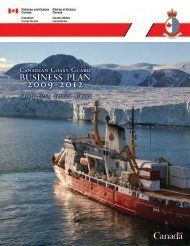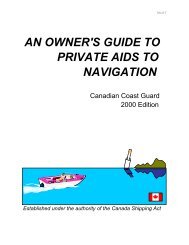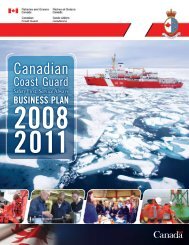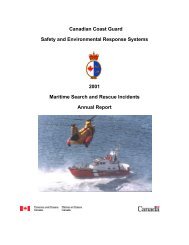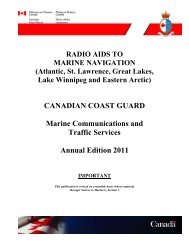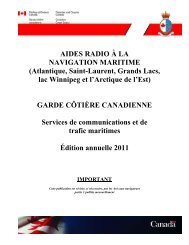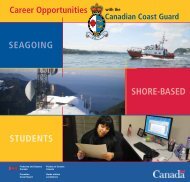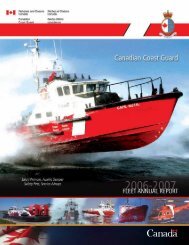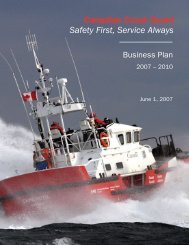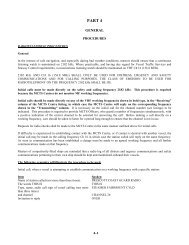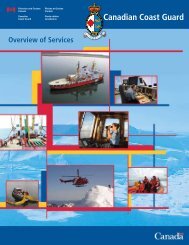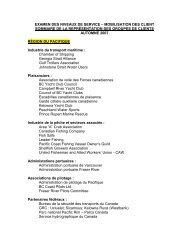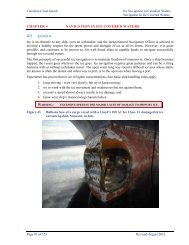RADIO AIDS TO MARINE NAVIGATION - Canadian Coast Guard
RADIO AIDS TO MARINE NAVIGATION - Canadian Coast Guard
RADIO AIDS TO MARINE NAVIGATION - Canadian Coast Guard
You also want an ePaper? Increase the reach of your titles
YUMPU automatically turns print PDFs into web optimized ePapers that Google loves.
<strong>MARINE</strong> COMMUNICATIONS AND TRAFFIC SERVICES MESSAGE SERVICE<br />
Message Charges<br />
Messages no longer accepted:<br />
(a)<br />
(b)<br />
Ships’ business messages;<br />
Private messages.<br />
Messages handled without charge by MCTS Centres:<br />
(a)<br />
(b)<br />
(c)<br />
(d)<br />
(e)<br />
(f)<br />
(g)<br />
(h)<br />
(i)<br />
(j)<br />
Messages pertaining to weather or ice information and ice routing;<br />
Messages concerning aids to navigation;<br />
AMVER Messages, addressed AMVER HALIFAX;<br />
Radiomedical messages;<br />
Messages reporting pollution;<br />
Messages addressed to a port or a member of the <strong>Canadian</strong> <strong>Coast</strong> <strong>Guard</strong> that involves a report of a ship<br />
movement, position or condition;<br />
Messages addressed to a Joint Rescue Co-ordination Centre (JRCC) or Maritime Rescue Sub-Centre<br />
(MRSC).<br />
Pilotage messages; Official Naval messages;<br />
Quarantine messages addressed to “Quarantine”;<br />
Messages requesting a doctor to meet the ship on arrival.<br />
Weather Messages<br />
Weather reports in the international meteorological code, made at the standard synoptic hours of 0000, 0600, 1200 and<br />
1800 UTC, are solicited from ships of all nationalities which have been recruited by their own national weather service, or<br />
other weather services, to make weather reports on a regular basis. These reports should be made and transmitted to the<br />
nearest MCTS Centre, irrespective of the ship’s position. In fact, reports made close to, or even within sight of land, are<br />
equally important to reports made offshore, due to the greater variability of weather conditions in proximity to a coastline.<br />
Pollution Messages<br />
All vessels plying <strong>Canadian</strong> and adjacent waters are requested to report oil slicks or pollution of any type to the nearest<br />
MCTS Centre.<br />
Medical Advice Messages<br />
Masters of ships may obtain medical advice by addressing a radiotelegram to “Radiomedical” and routing it via the nearest<br />
MCTS Centre which will refer the message to the nearest medical authority and transmit the reply to the ship.<br />
Quarantine Messages<br />
1. In the following circumstances only, the person in charge of a vessel shall, by radio, at least 24 hours prior to the<br />
vessel’s estimated time of arrival at its port of destination notify the quarantine officer at the quarantine station<br />
designated in paragraph (3) for that port of the occurrence. Where, in the course of a voyage of a vessel:<br />
(a) a member of the crew or a passenger on board the vessel exhibits one or more of these symptoms;<br />
• Fever or chills (profuse sweating, unusually flushed or pale skin, shivering,<br />
• Rash,<br />
• Stiff neck,<br />
• Confusion or disorientation,<br />
• Bruising or bleeding without injury,<br />
• Yellowing of skin or eyes,<br />
• Profuse watery or bloody stools,<br />
• Cough, difficulty breathing and/or sore throats,<br />
4-38



